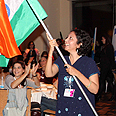
WIZO battles anti-Israeli sentiments worldwide
Women's Zionist organization marks its 90th anniversary, steps up global public relations campaign to teach young Jews history, Zionist values. 'Anti-Israeli sentiments are a new form of anti-Semitism,' warns WIZO chairwoman
In recent years we are witnessing a new form of anti-Semitism – anti-Israelism. But this time one cannot say "they started it" because "they" are part of us. Anti-israeli sentiments are the new form of anti-Semitism that prevails not outside, but within Jewish society.
The Women's International Zionist Organization, WIZO, which is marking its 90th anniversary, is currently holding its annual conference where it discusses the difficult reality Jewish communities' leaders face worldwide.
"What was obvious to the previous generation – that Israel's existence could be taken for granted, is not so obvious to the new generation living abroad," WIZO Chairwoman Tova Ben Dov told Ynet.
"The Arab and anti-Israeli public relations (hasbara) is so strong that sometimes you see someone from our side who's entirely brain-washed with propaganda against the State of Israel; many times we bow our head and say that it's just a passing trend, but that is not the right way – we should not be the silent Jew – we must go out and protest and most importantly strengthen the Diaspora," she said.
"We work hard on hasbara, because anti-Israeli sentiments is a form of anti-Semitism – an unprecedented world phenomenon that we try to draw attention to among Jewish and non-Jewish groups," said Ben Dov, "our representatives travel all around the world, giving lectures and pushing our agenda. We also have a representative in the UN that supplies informational material about Israel."
How do you educate for Zionism?
With all due respect to the United Nations, WIZO's struggle against the new anti-Semitism focuses on the younger generation, said Ben Dov: "You must put a lot of emphasis on education and the subject of Jewish and Israeli identity among young people in the Diaspora.
"Also within universities we engage in strong pro-Israel lobbying," Ben Dov explained,"it's important that the Jewish student doesn't just come to the university and take exams; we encourage the participation of the younger generation
"We distribute hasbara material, along with facts – because knowledge is power. We teach them history, so they know where they came from. It's amazing how unknowledgeable they are; there is so much ignorance, and ignorance is only the beginning – because when we don't have the knowledge – we can't defend ourselves," she added.
"Every WIZO federation has a PR committee that distributes information and visits every place it is asked to, but I think we are not aggressive enough. Maybe it's because in each country we operate – we follow the local mentality; in England," Ben Dov explained," more can be done, but it's not their mentality to scream and shout. In Finland, on the other hand, there are only some 1000 Jews, but it's amazing how they engage everyone, including non-Jews."
Ben Dov noted that in certain countries, "members need to operate secretly because of the regime. These are Zionist women that work tirelessly; some managed to come to the convention, but will not be able to take back with them any of the material we give out."
Cultivating Zionism is part of the organization's agenda not only abroad, but also in its educational institutes in Israel.
"Because of the widespread PR work abroad, sometimes youngster in the Diaspora know more than those who are raised in Israel," said Ben Dov. "It is equally important to indoctrinate kids here with basic values such as love for the nation. We consider human capital to be the most valuable resource we have in Israel. Despite limited funds, we do not want to cut back in the scope of activities we provide.
Ben Dov added that the organization receives "a lot of assistance from Israeli companies. It's not true that Israelis do not donate; many companies want to help the organization, but don't necessarily do so with financial donations, but with other means."
Jewish insurance policy
Ninty years after its formation, WIZO is taking an aggressive stance; it does not simply care for women's status and education in Israel – it fights for it. they acknowledge the difficulties, but refuse to give up.
"Women from 35 countries participated in the convention," said WIZO spokeswoman Nurit Lev. "There are women here from Italy, Australia, Mexico, India, Panama, Brazil, the United States, France, Finland, Sweden, the Netherlands etc'.
"All these women are community leaders that have to deal with a harsh reality of anti-Semitism and anti-Israeli sentiments, combined with lasting effects of a global financial crisis. While dealing with all this they enlist in order to raise financial and educational support for the State of Israel," said Lev.
"Our country is the insurance policy for the Jewish Diaspora," explained Ben Dov. "If Israel is strong, they can walk around with their heads up high. Our relationship with the Jewish Diaspora might change and become less dependant on philanthropy – such change will require a faster and younger pace. Things are already changing nowadays, because if we would have stayed the same way we were 90 years ago, we would have not been here – but the basic bond will always exist."










